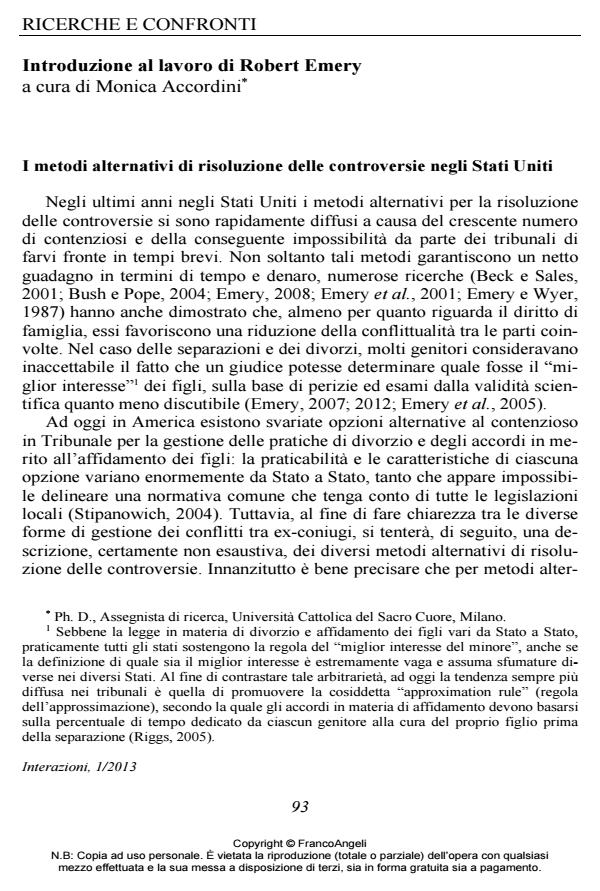Introduzione al lavoro di Robert Emery
Titolo Rivista INTERAZIONI
Autori/Curatori Monica Accordini
Anno di pubblicazione 2013 Fascicolo 2013/1
Lingua Italiano Numero pagine 6 P. 93-98 Dimensione file 333 KB
DOI 10.3280/INT2013-001007
Il DOI è il codice a barre della proprietà intellettuale: per saperne di più
clicca qui
Qui sotto puoi vedere in anteprima la prima pagina di questo articolo.
Se questo articolo ti interessa, lo puoi acquistare (e scaricare in formato pdf) seguendo le facili indicazioni per acquistare il download credit. Acquista Download Credits per scaricare questo Articolo in formato PDF

FrancoAngeli è membro della Publishers International Linking Association, Inc (PILA)associazione indipendente e non profit per facilitare (attraverso i servizi tecnologici implementati da CrossRef.org) l’accesso degli studiosi ai contenuti digitali nelle pubblicazioni professionali e scientifiche
- Beck C.J.A., Sales B.D. (2001). Family mediation: Facts, myths, and future prospects. The law and public policy. Washington DC: American Psychological Association.
- Bush R.A.B., Pope S.G. (2004). Transformative mediation: Changing the quality of family conflict interaction. In Folberg J., Milne A.L., Salem P. (Eds.), Divorce and family mediation: Models, tecniques and applications. New York: Guilford Press, pp. 53-71.
- Emery R.E. (2007). Rule or Rorschach? Approximating Children’s Best Interests. Child Development Perspective, 1(2): 132–134. DOI: 10.1111/j.1750-8606.2007.00029.x
- Emery R.E. (2008). La verità sui figli e il divorzio. Gestire le emozioni per crescere insieme. Milano: FrancoAngeli.
- Emery R.E. (2012). Renegotiating Family Relationships, Second Edition: Divorce, Child Custody, and Mediation. New York: The Guilford Press.
- Emery R.E., Laumann-Billings L., Waldron M.C., Sbarra D.A., Dillon P. (2001). Child custody mediation and litigation: Custody, contact, and coparenting 12 years after initial dispute resolution. Journal of Consulting and Clinical Psychology, 69(2): 323-332. DOI 10.1037/0022-006X.69.2.323.
- Emery R.E., Otto R.K., O’Donohue W.T. (2005). A Critical Assessment of Child Custody Evaluations. Limited Science and a Flawed System. Psychological Science in the Public Interest, 6(1): 1-29.
- Emery R.E., Wyer M.M. (1987). Child custody mediation and litigation: An experimental evaluation of the experience of parents. Journal of Consulting and Clinical Psychology, 55(2): 179-186. DOI 10.1037/0022-006X.55.2.179.
- Riggs S.A. (2005). Is the approximation rule in the child’s best interests? A critique from the perspective of attachment theory. Family Court Review, 43(3): 481-493. DOI 10.1111/j.1744-1617.2005.00048.x.
- Stipanowich T.J. (2004). ADR and the Vanishing Trial: The Growth and Impact of Alternative Dispute Resolution. Journal of Empirical Legal Studies, 1(3): 843. DOI 10.1111/j.1740-1461.2004.00025.x.
Monica Accordini, Introduzione al lavoro di Robert Emery in "INTERAZIONI" 1/2013, pp 93-98, DOI: 10.3280/INT2013-001007